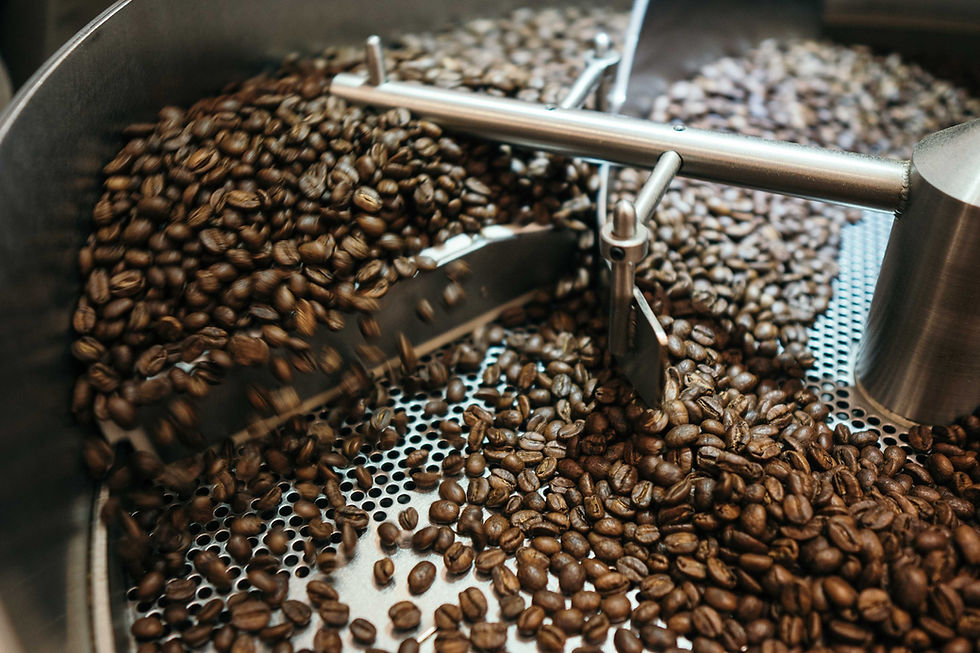Mastering the Art of Roasting Grass Valley Coffee Beans
- Gabriel Dias

- Jun 1, 2023
- 3 min read
Updated: Jun 14, 2023
As a seasoned coffee roaster, you understand that the journey from raw green beans to the aromatic, brown ones that constitute an enticing cup of coffee is largely influenced by the art and science of coffee roasting. However, roasting beans from the unique Grass Valley (Vale da Grama) region presents its own unique challenges and opportunities. Let's delve deeper into mastering the craft of roasting these exceptional beans.

Grass Valley (Vale da Grama) Beans: What Makes Them Unique
First and foremost, understanding the beans themselves is crucial. Grass Valley region coffee beans, grown at approximately 1,000m to 1,200m altitude and nurtured by mineral-rich volcanic soil, come with their own distinctive characteristics. The high-altitude cultivation imparts higher density and acidity to these beans. These properties play a crucial role in how they react to heat, allowing for a more extended roasting time and potentially, a broader spectrum of flavours.

Roasting Techniques: Tailoring for Grass Valley Beans
Grass Valley region beans respond differently to air roasting and drum roasting due to their inherent qualities. Air roasting or fluid bed roasting, known for excellent heat transfer and control, accentuates the vibrant, fruity notes of Grass Valley region beans, enhancing their bright cup profile.
Drum roasting, on the other hand, can bring out the complex, multi-layered nuances of these beans due to its conduction-based heating. This traditional method potentially imparts a fuller body and greater complexity to the coffee, making it a suitable choice for bringing out the best in Grass Valley region beans.

The Role of the Climate and Altitude in Roasting
The high altitude and unique climate of the Grass Valley region have a significant impact on the roasting process. Due to their high density, Grass Valley region beans can withstand higher roasting temperatures and longer roast times, allowing roasters to push boundaries and experiment with more extended development times.
In addition, the beans' inherent resilience towards the cold winters of the Grass Valley region prepares them for higher heat and faster roast times. This unique trait can be leveraged to explore diverse roast profiles, enabling roasters to craft a wide range of unique flavours.

Managing Heat Transfer: A Crucial Factor
A firm grasp of heat transfer principles becomes particularly crucial when roasting Grass Valley region beans due to their high density and resilience. Understanding the effects of conduction, convection, and radiation during the roast can help optimize the roast profile. High-density beans might require a higher charge temperature and a faster rate of rise at the start of the roast to ensure proper heat penetration.

Cupping: Assessing Your Roast
Regardless of how well you roast, cupping is essential to understanding the flavour outcome. Especially with Grass Valley region beans, owing to their diverse flavour potential, regular cupping sessions can reveal the impact of minute adjustments in the roast profile. This feedback loop allows you to refine your technique and consistently produce the best roasts possible from these exceptional beans.
In conclusion, mastering the art of roasting Grass Valley region beans is a fulfilling endeavour that calls for both technical knowledge and creative flair. As you explore the diverse flavour potential of these unique beans, remember that every roast is a learning experience. At BrazCof, we share your passion for this craft, and our commitment lies in supplying roasters with the finest quality green coffee beans, sourced directly from our farms and neighbours in the Grass Valley region. Together, we can continue to celebrate the exquisite profile of Grass Valley region beans, one roast at a time.



